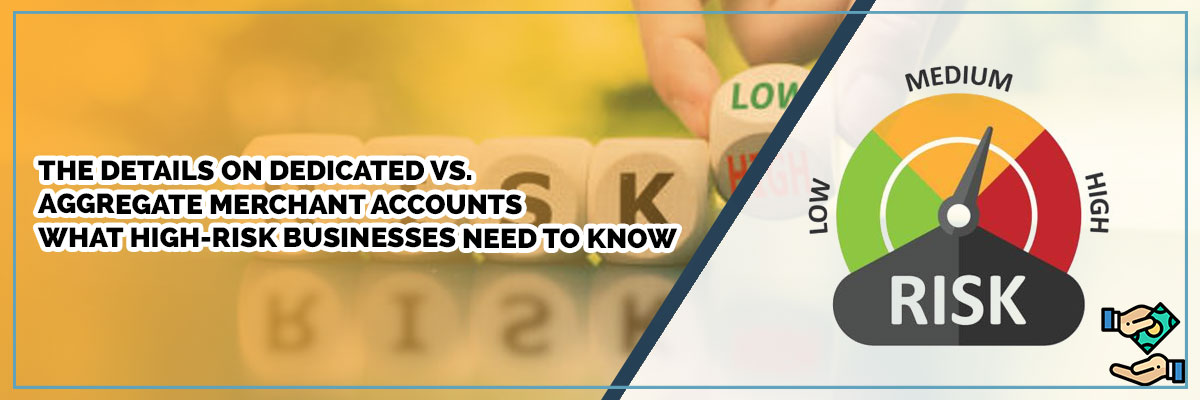
Nowadays, it’s almost mandatory for businesses to offer credit and debit card payments. While cash isn’t “dead,” cards are unquestionably the top way people like to pay for goods and services. According to recent data from NerdWallet, 80 percent of today’s consumers like using cards rather than physical money. Researchers also note that about ¾ of shoppers today have one credit card (if not more!) in their wallets.
Companies need a way to accept card transactions, especially on e-commerce platforms. However, it’s no secret that major credit card issuers have problems with high-risk businesses. If your company falls in the “high-risk” category, it’s impossible to accept major cards independently.
This is where high-risk merchant accounts come to the rescue. A solid high-risk merchant account should allow you to accept cards from clients without raising any red flags. However, business owners should know there are two merchant accounts available: dedicated and aggregate. Businesses must understand the core differences between these account styles to choose what’s suitable for their needs.

Dedicated merchant accounts offer businesses a more personalized payment processing experience. Since these accounts are always tailored to your business, you’ll enjoy greater autonomy in handling your finances. You can also rest assured that your partner will abide by transparent and stringent card processing standards.
Although your dedicated provider could restrict your account in exceptional circumstances, these accounts can’t intervene as quickly as an aggregated account provider. Also, since these plans are specific to each business, it’s easier to negotiate custom rates.
If you opt for a dedicated merchant account, you will enjoy exclusivity because you’ll be the only company in your processing plant. All the payments you receive will go into your new bank account, which means you have more control over your finances and credit score history.
Speaking of credit scores, you’ll need to prepare for a thorough screening before getting a dedicated merchant account. In most cases, it takes about two days to get approval for a dedicated merchant account. Integrating the payment solution into your website or brick-and-mortar POS system could take a few days.
Since the fintech revolution began, aggregate business accounts have been all the rage. Unlike dedicated merchant accounts, aggregate providers work with many companies on one platform at one flat rate. Whenever a sale goes through an aggregate provider’s service, it must clear the third party’s system before entering your bank account.
The major attraction with aggregate accounts like Square is that they’re fast & simple to set up. Also, unlike dedicated merchant accounts, you usually don’t have to submit as many financial details to get approved.
However, please remember that you do not entirely control an aggregate business account. In other words, you must consider the other companies using this processing platform. Whether you like it or not, you will be associated with every other business that uses an aggregate account like PayPal.
Also, aggregate payment platforms can easily block accounts that don’t meet their policies. If the third-party provider decides to blacklist your business, it’s virtually impossible to get back on or fight their decision.

Dedicated and aggregate accounts allow businesses to process card transactions, but they go about it differently. With dedicated accounts, you’ll enjoy greater control over your money and a plan that fits your business’s needs. However, you usually have to pay more for this service. Also, companies just starting or with below-average credit scores are often excluded from dedicated accounts.
On the aggregate account side, it’s easier for start-ups to launch their payment portal in minutes, even if they don’t have much financial data. Aggregate accounts also offer predictability with their fees and are easy to work with. Yet, you have to trade away personalization for these conveniences. Aggregate accounts also create rules for what businesses they want to work with, and these standards could change anytime.
Typically, high-risk businesses have a better time working with dedicated merchant accounts. While these accounts may cost more and take longer to set up, they provide the personalization high-risk account holders need.
Most big aggregate merchant providers don’t deal with companies with a “high-risk” status. Plus, since many companies are on an aggregate payment platform, you can’t discuss your business’s case in detail with your partner. Often, you have no recourse if you get blacklisted on an aggregate payment account.
This doesn’t mean certain high-risk businesses can’t use aggregate accounts, but this strategy tends to be less successful. Ideally, company owners should speak with a merchant account provider to fully understand their risk profile and options.
Before you decide to go with an aggregate or dedicated merchant account, we’d encourage you to speak with a company that knows the intricacies of high-risk payment processing. Shark Processing has years of experience setting up successful payment options for companies in high-risk industries.
Please send Shark Processing a message on this page for a free no-commitment consultation.